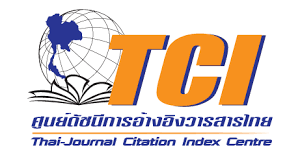การวิเคราะห์องค์ประกอบเชิงยืนยันของโมเดลทักษะการบัญชีสืบสวน : มุมมองของผู้ปฏิบัติงานด้านการตรวจสอบภาครัฐ
คำสำคัญ:
ทักษะการบัญชีสืบสวน, ผลการปฏิบัติงานตรวจสอบ, ผู้ปฏิบัติงานตรวจสอบภาครัฐบทคัดย่อ
งานวิจัยนี้มีวัตถุประสงค์เพื่อวิเคราะห์องค์ประกอบเชิงยืนยันของโมเดลทักษะการบัญชีสืบสวน: มุมมองของผู้ปฏิบัติงานด้านการตรวจสอบภาครัฐ และจัดทำอันดับความสำคัญขององค์ประกอบเก็บรวบรวมข้อมูลโดยแบบสอบถามจากผู้ปฏิบัติงานด้านการตรวจสอบภาครัฐ จำนวน 376 ราย วิเคราะห์ข้อมูลด้วยโปรแกรมสำเร็จรูปทางสถิติ สถิตที่ใช้วิเคราะห์ คือ การวิเคราะห์โมเดลสมการโครงสร้างผลการวิจัยพบว่า ข้อมูลมีความสอดคล้องกลมกลืนกับข้อมูลเชิงประจักษ์ในเกณฑ์ดี โดยโมเดลมีความเที่ยงตรงซึ่งมีค่าสถิติ Chi-Square = 118.196 df. = 95 P-value = 0.054 GFI = .967 RMSEA = .026 โดยมีองค์ประกอบของโมเดลทักษะการบัญชีสืบสวน จำนวน 6 องค์ประกอบ พบว่า น้ำหนักองค์ประกอบทุกองค์ประกอบมีนัยสำคัญทางสถิติที่ระดับ 0.01 โดยเรียงลำดับความสำคัญจากค่าน้ำหนักองค์ประกอบจากมากไปหาน้อย คือ ทักษะเกี่ยวกับกฎหมาย (SLO) ทักษะเกี่ยวกับเอกสารหรือหลักฐาน (SDU) ทักษะเกี่ยวกับทักษะการตรวจสอบ (SAU) ทักษะทางด้านเทคโนโลยีสารสนเทศ (SIT) ทักษะเกี่ยวกับแนวคิดการทุจริต (SFU) ทักษะด้านการเจรจาการติดต่อสื่อสาร (SCM) ประโยชน์จากงานวิจัยจะเป็นข้อมูลพื้นฐานในการนำไปสู่การกำหนด กรอบแนวทางในการต่อต้านการทุจริตทั้งภาครัฐ รวมถึงผลักดันส่งเสริมพัฒนาผู้สอบบัญชีภาครัฐให้มีทักษะในด้านการตรวจสอบสืบสวนด้านการทุจริตในอนาคตต่อไป
เอกสารอ้างอิง
เสาวนีย์ สิชฌวัฒน์. (2544). การบัญชีสืบสวน (Forensic Accounting). วารสารบริหารธุรกิจ, 90, 6-10.
ศิลปพร ศรีจั่นเพรช. (2553). มารู้จักกับการบัญชีสืบสวน. วารสารวิชาชีพบัญชี, 6(17), 22-28.
วิไล เพ็ชรประดับฟ้า. (2559). Forensic Accounting กับการตรวจสอบทรัพย์สินในคดีล้มละลาย. วารสารกรมบังคับคดี. 20(100), 3-6.
พรรณนิภา รอดวรรณะ. (2556). นิติบัญชีศาสตร์. จดหมายข่าวสภาวิชาชีพบัญชีฯ, (9), 8-10.
สมชาย ศุภธาดา. (2541). การบัญชีนิเวชศาสตร์: ถึงเวลานักบัญชีไม่อาจปฏิเสธ. วารสารนักบัญชี, (เมษายน–กรกฎาคม), 41-46.
นิอร องอาจสิทธิกุล และเสาวนีย์ สิชฌวัฒน์. (2550). การบัญชีสืบสวนในทัศนคติของผู้สอบบัญชี: การบัญชีสืบสวนในประเทศไทย. วารสารวิชาชีพบัญชี, (3)6, 66-76.
ธานินทร์ ศิลป์จารุ. (2557). การวิจัยและการวิเคราะห์ข้อมูลทางสถิติด้วย SPSS และ AMOS. (พิมพ์ครั้งที่ 15). กรุงเทพฯ: ห้างหุ้นส่วนสามัญบิสซิอาร์แอนด์ดี.
Aaker, D. A., V. Kumar & G. S. Day. (2001). Marketing Research. New York: John Wiley and Sons.
Cohen, L. and Manion, L. (1989). Research Methods in Education. 3rdedition. London: Routledge.
Doody, H. (2009). Fraud risk management: A guide to good practice. London, England: Chartered Institute of Management Accountants.
Goudie, A.W. & Stasavage, David. (1977). Corruption: The Issues. Organization for Economic Cooperation and Development (OECD). Technical, 122.
Karuna Nathalang, and Kornthong Luangvilai. (2003). Forensic Accounting: Contemporary Issue in
Thailand.Masters independent study, Faculty of Commerce and Accountancy, Thammasat University.
Larry, D. & Nicholas Apostolou. (2002). Forensic Accounting: A New Growth Area in Accounting. Ohio CPA Journal, p 16.
Michael, Johnston. (1995). The Search for Definitions: The Vitality of Politics and the Issue of Corruption. USA: Colgate University.
Nunnally, J. C. and I. H. Bernstein. (1994). Psychometric Theory. New York.
Ramamoorti, S. (2003), Chapter 1. Internal Auditing: History, Evolution, and Prospects, pp. 2- 23, in Bailey, A.D., Gramling, A.A., Ramamoorti, S. (Editors), Research Opportunities in Internal Auditing, Altamonte Springs: The Institute of Internal Auditors Research Foundation.
Sandholtz, Wayne, & Koetzle, William. (2000). Accounting for Corruption: Economic Structure, Democracy and Trade. International Studies Quarterly: Blackwell Publishing and The International Studies Association: JSTOR, 44(1), 31-50.






